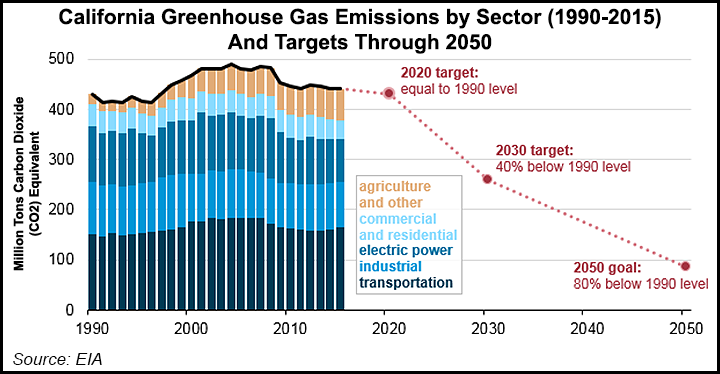Regulatory | NGI All News Access
Los Angeles County Joins California Carbon Chase
The Los Angeles County Board of Supervisors on Tuesday unanimously approved a sustainability plan with a goal to eliminate the use of fossil fuels by mid-century, mirroring the state’s ambitious climate change policies.

Dozens of stakeholders and citizens spoke mostly in favor of the first-of-its-kind local government plan, although labor union members and representatives from the oil and gas industry urged a slow and careful approach to phasing out fossil fuels, given their economic role in a county that is one of the nation’s largest metropolitan areas.
Long-time environmental advocate and Supervisor Sheila Kuehl said the plan offers a “real roadmap” for future officials who will have to implement it. Co-sponsor is Supervisor Hilda Solis, former secretary of Labor in the Obama administration.
Critics argued that the county has not resolved the future of the hobbled Aliso Canyon underground natural gas storage field nor has it satisfied residents who live near urban oilfields, yet it is moving ahead to reduce fossil fuels and create a zero-emissions public transportation system.
The county committed to meeting the goals of the United Nations’ global climate accord reached in late 2015, aka the Paris Agreement. The county in 2015 produced 105 million metric tons of carbon dioxide equivalent greenhouse gas (GHG) emissions. At the end of last year it had 894 MW of installed distributed generation.
The plan is to reduce GHG emissions in 2025 by 25%. County facilities, which received 31% of electricity from renewables in 2017, aim to receive all their power from alternative sources by 2025.
Southern California Gas Co. pledged the utility’s support for the plan, touting a switch to renewable natural gas as one way to reach carbon neutrality by 2045.
© 2024 Natural Gas Intelligence. All rights reserved.
ISSN © 1532-1231 | ISSN © 2577-9877 |
